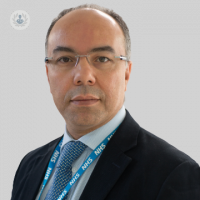What you need to know about inguinal hernias
Written by:If you have an inguinal hernia, you might begin to notice potential symptoms such as pain, discomfort or a lump.
If you’re concerned about getting treatment for an inguinal hernia, leading consultant laparoscopic and gastrointestinal surgeon in London and Orpington Mr Rajab Kerwat provides a detailed insight to this condition in this informative article.

What is an inguinal hernia?
An inguinal hernia is when a portion of tissue, such as a part of the intestine, pushes through a weakened spot in the muscles of the abdominal wall and into the inguinal canal.
How is an inguinal hernia diagnosed?
Inguinal hernia diagnosis is typically based on:
- the history of symptoms;
- a physical exam and;
- possibly imaging tests.
External hernias can often be detected in a physical exam, since typically they cause a bulge that’s visible or can be felt in certain situations.
Your doctor will feel for a hernia while you sit, stand or even cough. They may also undertake imaging tests such as an ultrasound or computed tomography (CT) scan.
What are the symptoms of an inguinal hernia?
Symptoms of an inguinal hernia may include a bulge in the groin area that is more noticeable when you are standing up, particularly when you cough or strain. It may disappear when lying down. Other symptoms of an inguinal hernia may include:
- an ache;
- burning;
- discomfort;
- pain or a heavy or dragging sensation in your groin around the bulge.
What causes an inguinal hernia?
An inguinal hernia occurs when fatty tissue or a part of your bowel pokes through into your groin at the top of your inner thigh.
This is the most common type of hernia and it mainly affects men. It’s often associated with ageing and repeated strain on the tummy.
The exact cause is not known but it is believed that a weakness in the abdominal wall as a result of aging or muscle strain causes the fatty tissue, or a part of the intestine to bulge into the groin.
How is an inguinal hernia treated?
Hernia can be treated based on the size of the bulging and severity. Doctor may suggest lifestyle changes, medication or surgery. If your hernia is small and isn’t bothering you, your doctor may recommend watchful waiting. This is where you closely watch your condition but don’t have treatment unless symptoms appear or change.
Wearing a supportive truss may help relieve symptoms, but you should check with your doctor first. This is because it’s important that the truss fits properly, and is being used appropriately.
You may need surgery if your hernia is causing discomfort or is growing larger. There are two types of hernia repair surgeries: open hernia repair and laparoscopy.
Open hernia repair
In open hernia repair, the protruding tissues are pushed back through an incision in the groin, and a synthetic mesh is stitched around the weak spot.
Laparoscopy
Laparoscopy is minimally invasive surgery, or keyhole surgery, to repair the tissues of the weak area.
Looking for an expert to treat your inguinal hernia? Arrange an appointment with Mr Kerwat via his Top Doctors profile.


